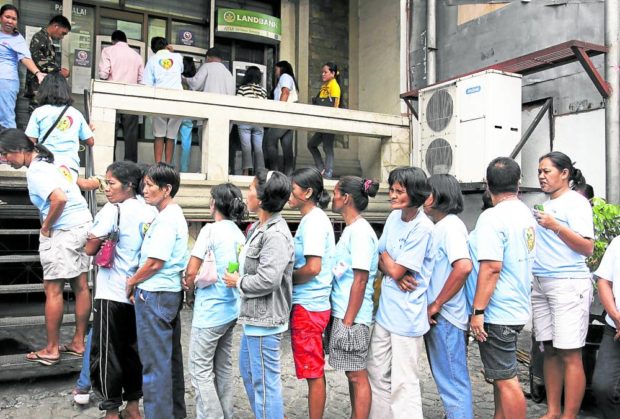
IMPROVING PEOPLE’S LIVES | Beneficiaries of the government’s Pantawid Pamilyang Pilipino Program (4Ps) in Lucena City, in this photo taken in 2011, wait for their turn outside a bank to get their monthly cash grants. Families under the program receive assistance to ensure that their children will get health care and education in order to improve their quality of life. —DELFIN T. MALLARI JR.
CEBU CITY, Cebu, Philippines — The Department of Social Welfare and Development (DSWD) is reevaluating the status of at least 90,000 beneficiaries of the Pantawid Pamilyang Pilipino Program (4Ps) in Central Visayas after they have been classified as “nonpoor.”
Shalaine Marie Lucero, the DSWD officer in charge in the region, said these beneficiaries were among the 1.3 million 4Ps members in the country who were set to leave the program as announced by Social Welfare Secretary Erwin Tulfo because they were no longer qualified to receive cash assistance from the government.
Until they had been reevaluated, she added, their names would still be at the National Household Targeting System, which keeps the list of beneficiaries of the government’s conditional cash transfer program.
Lucero said they had to locate these 90,000 4Ps members so the DSWD could conduct a reassessment.
“We have to verify if they are really poor. And to do that, the assessment will be done house-to-house. Calling them through the phone is not enough,” she said.
Improved lives
Nonpoor beneficiaries are those whose lives have improved while under 4Ps, according to Lucero.
The DSWD, she said, conducts regular assessments to determine which households no longer need the cash aid from the government.
“In our case in Central Visayas, they [beneficiaries] were assessed and the result revealed that they are already nonpoor,” Lucero said.
“We will validate and assess them further using our social welfare and development indicator to determine their level of well-being,” she added.
The DSWD designed a particular rating system to delineate poverty thresholds using a statistical model that approximates household income based on household characteristics, such as educational attainment, livelihood or occupation of household members, and the appliances, pieces of furniture and other assets they owned.
Lucero said 37,890 4Ps beneficiaries in Central Visayas would exit the program in August since they no longer have children up to 18 years old and that they had been “overstaying” in the program. Beneficiaries can only be part of the 4Ps program for seven years.
Other beneficiaries, she said, will exit the program for committing some infractions while others had reached the so-called self-sufficient status.
Local gov’t support
Lucero had encouraged local governments to support 4Ps beneficiaries who would leave the program so they would not return to poverty.
The 4Ps program is a conditional cash transfer program of the government overseen by the DSWD to help eradicate extreme poverty in the Philippines by investing in health and education, particularly of children up to 18 years old.
In 2019, then President Rodrigo Duterte signed into law an act institutionalizing the 4Ps to “promote a just and dynamic social order thereby uplifting its citizens and marginalized sectors from poverty through policies that provide adequate social services, promote full employment, a rising standard of living, and an improved quality of life for all.”
Eligible beneficiaries of the 4Ps program include farmers, fisherfolk, homeless families, indigenous peoples, informal settlers and those in far-flung areas, including those in areas without electricity.